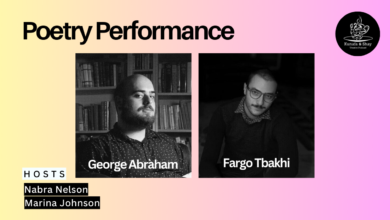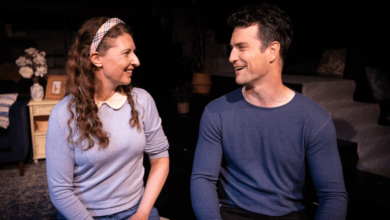
Another artist who was primed and ready to step into these spaces is the playwright and performer Liz Morgan. It seems an obvious fit. Liz is the director of training and pedagogy at Theatre of the Oppressed NYC, the stellar organization that uses Augusto Boal’s iconic and impactful theatre of the oppressed techniques to challenge economic inequality, racism, and other social, health, and human rights injustices.
The aesthetic of Radical Evolution’s circus show weaponizes humor and satire to strategically assault systems of power.
Her activation into the movement for Palestine primarily comes through her participation in an ensemble of artists from Radical Evolution, a company I co-founded. The artists of Street Theatre Crew make work “For the Streets and For the People.” Inspired by their training with the historic street theatre company Jana Natya Manch and the construct of El Teatro Campesino’s “actos,” short agitprop political plays, the Street Theatre Crew took satirical aim at the media’s blatant and biased coverage of Israel’s assault and genocidal aims in Palestine. They created a “Modern Media Circus” in which Liz takes center stage as the frighteningly out of control Ringleader, a character she wrote with obfuscating, rhyming banter:
And if my grandiosity and grand verbosity already has your head spinning, turn your gaze to our first act as they spin the truth, toeing the line of “objective reporting,” walking the tightrope of bias. They’re gravity-defying and massacre-denying… Behold Our Flying Lying Alternative Factrobats!
The show had its first public sharing at the People’s Fair, and most team members reported being incredibly nervous. After all, many events surrounding the devastation of Palestine are rightfully somber events, and the aesthetic of Radical Evolution’s circus show weaponizes humor and satire to strategically assault systems of power. In this way, the show stood out significantly from other events on the bill. And Liz, as the ringleader in the center of it all, was understandably nervous. In an interview for this article, she told me she “was just like, ‘are we going to get up there and just make folks upset?’ It’s possible that we did, but in the right way. Making sure that people stay angry and that people have laughter and joy is also part of the work.”
But it was clear to the team that by the time the show crescendoed to its penultimate song-and-dance number, “Don’t Say Genocide,” the audience was with them. In this case, it seemed that after a few hours of heavy emotions, the audience seemed ready and willing to laugh. As El Teatro Campesino’s founder, Luis Valdez, once said, “You have to make fun of the tragedy in life in order to overcome it.”
These are just three of the many, many artists working around the clock to support a liberated Palestine. They reflect the true strengths of this kind of grassroots movement, both unified in purpose and pluralistic in its web of leadership. One of these strengths is the movement’s decentralization. After all, it’s hard to topple a movement without a top. There are many different groups mobilizing in many different ways, and each of the artists mentioned above is finding their own ways to lean into their strengths to support this movement: Leah through organizing artists; Fouad through musical theatre, autobiography, and comedy; Liz through street theatre. Each one defining and uplifting the value and necessity of “cultural resistance.”
This is the best boot camp for coming together and supporting each other because our freedom is not guaranteed.
This strategy is one of many challenges as well. Cultural workers, activists, organizers, and more are constantly working to create a network that is a “net-that-works.” Without this interconnected weave, common issues come up. Chief among them are the all-too-familiar issues of burn-out (because the same few people are doing 90 percent of all the difficult, time-consuming labor) and splintering of groups. While completely committed, each of these artists also spoke to me of the level of exhaustion that has begun to set in.
This is why artists such as Leah, Fouad, Liz, and so many others, and the smaller, more nimble organizations and cohorts working alongside them, are so essential. Organizers call out to artists in almost every movement and activist space I have experienced: “Please make propaganda for us. Make our revolution irresistible.” This call is as old as the need for social change. Movements need artists at every step. They need us. Palestine needs us. The Freedom Theatre needs us. The Movement need us. And we need them. As Leah Bachar asserts:
One of the biggest reasons why I am part of this movement is because I don’t consider it only a Palestinian cause. And while, yes, people are talking about Palestine, we’re also talking about ourselves. All of these things are things that can happen here in the United States. And so, as cultural workers, we’re no different than anybody that is under occupation. This is the best boot camp for coming together and supporting each other because our freedom is not guaranteed to be permanent.
So that call sounds on the corners, in the rallying spaces, and out in the streets; and it leads each and every artist to the inevitable questions:
Are you listening?
Will you answer?





